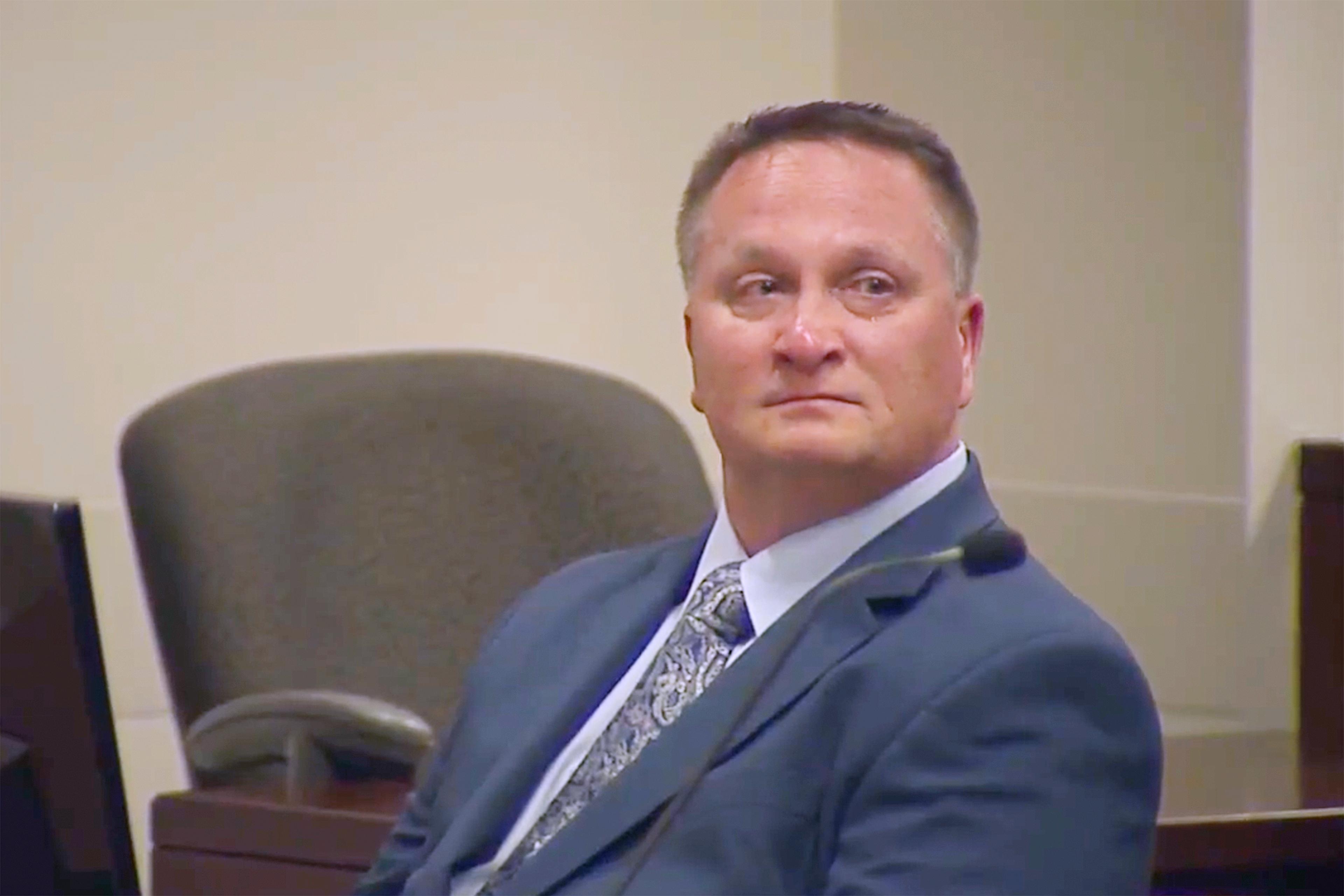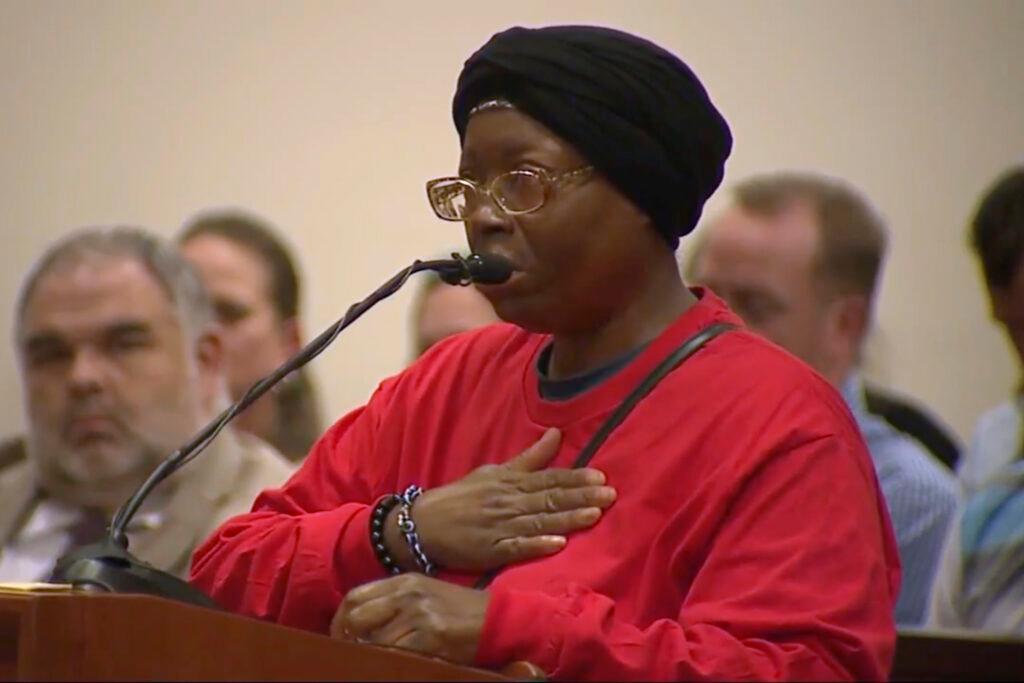
The former Aurora paramedic who injected a 23-year-old unarmed Black man with ketamine that ultimately killed him was sentenced today to 14 months with work release and four years of probation and community service.
Jeremy Cooper, 49, forcibly administered an overdose of the powerful sedative to Elijah McClain, a 23-year-old massage therapist walking home from the convenience store, after McClain had a violent struggle with police. He was never suspected of committing any crime.
At the time, McClain was subdued and in handcuffs. After being injected with the ketamine in his shoulder, he lost consciousness and then lost his pulse in the ambulance. McClain died a few days later in the hospital.
State Judge Mark Warner addressed Cooper before sentencing him. He said the former paramedic was on the scene long enough to have intervened — and he didn’t.
“The bodycam videos were painful to watch … It was clear from the videos that Elijah McClain was in an acute medical condition prior to the injection. The life of Elijah McClain mattered and matters. It’s almost unthinkable the way things rolled out,” Warner said. “A young man died for really no reason. It didn’t have to happen. It could have turned out much differently.”
Warner acknowledged that he believed Cooper was contrite, and believed his record of service, but said he didn’t see that exhibited the night of McClain’s confrontation with authorities.
Work release typically allows convicted defendants to spend weekends and nights in jail, but go out and work during the day. But it was unclear immediately on Friday whether Cooper will spend any time actually incarcerated. Prosecutors said it was up to Adams County probation officials.
Last year, an Adams County jury convicted Cooper of criminally negligent homicide. His supervisor, Peter Cichuniec, was also convicted of criminally negligent homicide and second-degree assault because he authorized the ketamine.
Friday’s sentencing marks the culmination of years of hearings and trials and delays for five first responders who were charged with McClain’s death by the state attorney general’s office. Three of the five, an officer and both paramedics who administered the sedative, were convicted last year in three trials.
Cichuniec was sentenced to five years in state prison and three years of parole earlier this year.
After the court was dismissed, Sheneen McClain had some strong, angry words for the outcome outside of the Adams County courthouse in Brighton.
“He will always be scum. It doesn't matter what he does” McClain said outside the courthouse. “It doesn't matter what anybody else does to wipe the blood of my sons off their hands. It's already there. Stained.”
In August 2019, Aurora officers responded to a suspicious person call when McClain was walking home from a convenience store with a bag of iced teas.
Three Aurora officers forcibly detained him and took him to the ground. They administered two carotid holds, which cut blood flow off to his brain, and then paramedics on the scene gave him the sedative before he lost his heartbeat in the ambulance.
In an emotional hearing on Friday, an angry Sheneen McClain addressed the judge about how Cooper’s decisions that night forever changed her life and took away her son.
“Eternal shame on you all,” she said. “When I repeatedly look at the videos of my son’s murder … I wonder why no one took the time to look within themselves to do the right thing … Jeremy Cooper didn’t ask how my son was doing under the weight of a monster.”

Cooper spoke to the judge before being sentenced and addressed Elijah McClain from the courtroom podium.
“There is so much I want to say. I want you to know how sorry I am that I couldn’t save you,” he said, tearfully. “Elijah, I never ever meant for anyone to hurt you. I am so sorry collectively that we have failed you.”
He continued, “All I wanted to do was help. I will live with the decisions of this night and I’ll live with your soul in my heart for the rest of my life.”
With that, McClain’s mother, Sheneen, and some of her supporters walked out of the courtroom and Cooper’s family and supporters began weeping.
Later, Sheneen addressed Cooper in front of the judge, “You cannot evoke my son’s name to absolve you of your own sinful nature, your attempts disrespect me,” she said. “It all shows your culture will not change because you find no fault in your actions.”
Cooper’s family and colleagues also addressed Warner telling stories of his heroism on the job as an Aurora Fire Rescue paramedic and his kindness at home as a father of three.
His wife, Tarrah Cooper, said her husband always treated patients and talked about them with integrity.
“Jeremy's line was always, I don't care what time it is, I don't care what they look like or how tired you are, what they smell like, what they act like. These are human beings and they deserve to be treated with respect,” she said.
Cooper’s wife recalled the night McClain died and how distraught Cooper was when he told her about it.
“Please spare my husband for me,” she said, tearfully addressing the judge. “Please don’t take a perfectly fit .. public servant out of his home.”
Kathleen Hancock, a Black firefighter and former colleague of Cooper’s, acknowledged how hard it was for her to be there with Sheneen listening a few feet away. But she said she knew Cooper’s heart and that he thought about what happened that night frequently.
“There’s no doubt in my mind that every day he wakes up, every day he goes to bed, every second, every minute, every hour,” she said. “What could I have done better? What could I have done differently?”
Dr. Eric Hill, who was Cooper’s boss as medical director at Aurora Fire Rescue, shed light on Cooper’s sentiments after McClain lost his pulse. Hill said Cooper stayed longer on his shift to try and figure out what happened.
“It was not a guy who wanted to shed the problem,” Hill said. “He wanted to get his patient out of the situation … These are human beings and they deserve to be treated with respect. This is Jeremy, this is who he is to his core.”
Lead prosecutor, assistant attorney general Jason Slothouber, evoked the internal affairs investigation video they played during the trial which showed Cooper fabricating details about what happened that night, including that McClain was trying to get up and crawl away. McClain was subdued.
“It was divorced from reality,” he said. “The choices Cooper made not to monitor Elijah … and not to do anything for six minutes before they found out he was dead … Mr. Cooper needs to have primary accountability.”
Slothouber acknowledged Cooper’s life of service.
“Even the prosecution acknowledges that his past history of service though makes it all the more tragic that the hero of another story is the villain of Elijah McClain’s,” he said.
Attorney General Phil Weiser said in an emailed statement that Friday’s sentencing marks the end of a very long chapter.
"With this sentence, we now have accountability for another defendant who failed to act the way the law requires, and we have a measure of justice for Elijah McClain, his family, and loved ones,” Weiser said in the statement. “True justice, however, would be having Elijah alive today. His death was an unnecessary tragedy.”
Others in the community are disappointed by the lenient sentence.
“There wasn't justice for Elijah McClain. We must continue the fight for public safety reform and accountability for any public safety officer who abuses their power. … we are still far behind in our efforts for true public safety reform,” said NAACP Aurora Chapter President Omar Montgomery on Friday afternoon.
He said that the NAACP stands with Sheneen McClain.
- Paramedics found guilty of criminally negligent homicide in death of Elijah McClain
- Updates: The trial of the paramedics charged in Elijah McClain’s death
- Ahead of the trial of paramedics charged in death of Elijah McClain, Aurora Fire Rescue practices de-escalation
- Aurora Police officer Nathan Woodyard found not guilty in death of Elijah McClain
- One Aurora officer found guilty by jury on lesser charges in death of Elijah McClain









